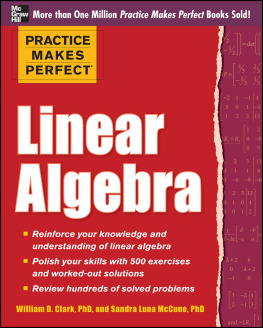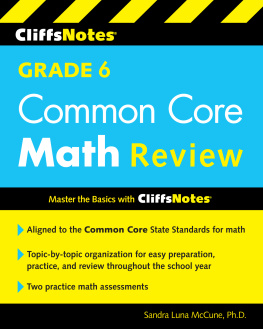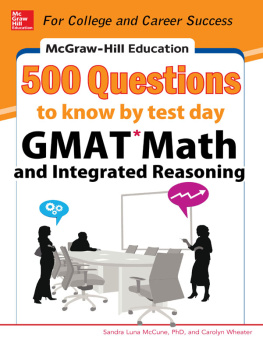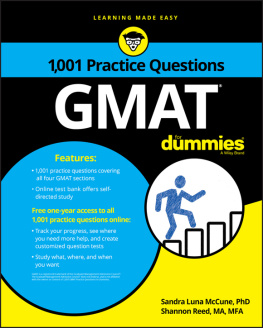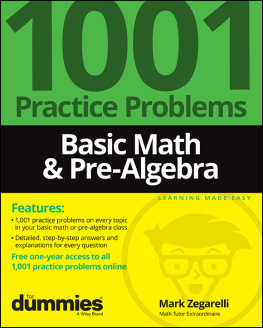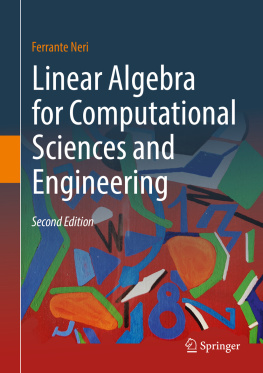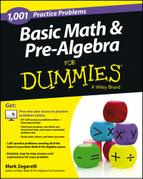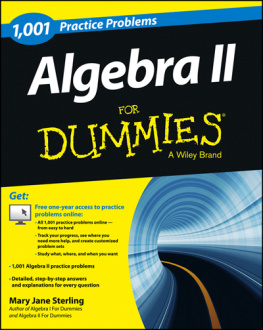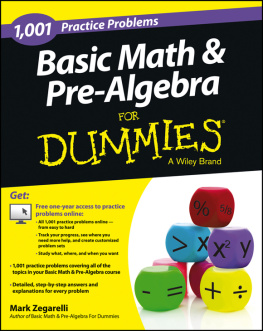Sandra Luna McCune - Practice Makes Perfect Linear Algebra
Here you can read online Sandra Luna McCune - Practice Makes Perfect Linear Algebra full text of the book (entire story) in english for free. Download pdf and epub, get meaning, cover and reviews about this ebook. year: 2013, publisher: McGraw-Hill, genre: Children. Description of the work, (preface) as well as reviews are available. Best literature library LitArk.com created for fans of good reading and offers a wide selection of genres:
Romance novel
Science fiction
Adventure
Detective
Science
History
Home and family
Prose
Art
Politics
Computer
Non-fiction
Religion
Business
Children
Humor
Choose a favorite category and find really read worthwhile books. Enjoy immersion in the world of imagination, feel the emotions of the characters or learn something new for yourself, make an fascinating discovery.
- Book:Practice Makes Perfect Linear Algebra
- Author:
- Publisher:McGraw-Hill
- Genre:
- Year:2013
- Rating:3 / 5
- Favourites:Add to favourites
- Your mark:
- 60
- 1
- 2
- 3
- 4
- 5
Practice Makes Perfect Linear Algebra: summary, description and annotation
We offer to read an annotation, description, summary or preface (depends on what the author of the book "Practice Makes Perfect Linear Algebra" wrote himself). If you haven't found the necessary information about the book — write in the comments, we will try to find it.
Practice Makes Perfect Linear Algebra — read online for free the complete book (whole text) full work
Below is the text of the book, divided by pages. System saving the place of the last page read, allows you to conveniently read the book "Practice Makes Perfect Linear Algebra" online for free, without having to search again every time where you left off. Put a bookmark, and you can go to the page where you finished reading at any time.
Font size:
Interval:
Bookmark:
Copyright 2013 by The McGraw-Hill Companies, Inc. All rights reserved. Except as permitted under the United States Copyright Act of 1976, no part of this publication may be reproduced or distributed in any form or by any means, or stored in a database or retrieval system, without the prior written permission of the publisher. ISBN: 978-0-07-177844-2
MHID: 0-07-177844-6 The material in this eBook also appears in the print version of this title: ISBN: 978-0-07-177843-5, MHID: 0-07-177843-8. All trademarks are trademarks of their respective owners. Rather than put a trademark symbol after every occurrence of a trademarked name, we use names in an editorial fashion only, and to the benefit of the trademark owner, with no intention of infringement of the trademark.
Where such designations appear in this book, they have been printed with initial caps. McGraw-Hill eBooks are available at special quantity discounts to use as premiums and sales promotions, or for use in corporate training programs. To contact a representative please e-mail us at bulksales@mcgraw-hill.com. McGraw-Hill, the McGraw-Hill Publishing logo, Practice Makes Perfect, and related trade dress are trademarks or registered trademarks of The McGraw-Hill Companies and/or its affiliates in the United States and other countries and may not be used without written permission. All other trademarks are the property of their respective owners. (McGraw-Hill) and its licensors reserve all rights in and to the work. (McGraw-Hill) and its licensors reserve all rights in and to the work.
Use of this work is subject to these terms. Except as permitted under the Copyright Act of 1976 and the right to store and retrieve one copy of the work, you may not decompile, disassemble, reverse engineer, reproduce, modify, create derivative works based upon, transmit, distribute, disseminate, sell, publish or sublicense the work or any part of it without McGraw-Hills prior consent. You may use the work for your own noncommercial and personal use; any other use of the work is strictly prohibited. Your right to use the work may be terminated if you fail to comply with these terms. THE WORK IS PROVIDED AS IS. McGRAW-HILL AND ITS LICENSORS MAKE NO GUARANTEES OR WARRANTIES AS TO THE ACCURACY, ADEQUACY OR COMPLETENESS OF OR RESULTS TO BE OBTAINED FROM USING THE WORK, INCLUDING ANY INFORMATION THAT CAN BE ACCESSED THROUGH THE WORK VIA HYPERLINK OR OTHERWISE, AND EXPRESSLY DISCLAIM ANY WARRANTY, EXPRESS OR IMPLIED, INCLUDING BUT NOT LIMITED TO IMPLIED WARRANTIES OF MERCHANTABILITY OR FITNESS FOR A PARTICULAR PURPOSE.
McGraw-Hill and its licensors do not warrant or guarantee that the functions contained in the work will meet your requirements or that its operation will be uninterrupted or error free. Neither McGraw-Hill nor its licensors shall be liable to you or anyone else for any inaccuracy, error or omission, regardless of cause, in the work or for any damages resulting therefrom. McGraw-Hill has no responsibility for the content of any information accessed through the work. Under no circumstances shall McGraw-Hill and/or its licensors be liable for any indirect, incidental, special, punitive, consequential or similar damages that result from the use of or inability to use the work, even if any of them has been advised of the possibility of such damages. This limitation of liability shall apply to any claim or cause whatsoever whether such claim or cause arises in contract, tort or otherwise. Practice Makes Perfect: Linear Algebra is designed to help you to be successful in learning this interesting and practical subject matter. Practice Makes Perfect: Linear Algebra is designed to help you to be successful in learning this interesting and practical subject matter.
However, the book is not intended to introduce concepts, but rather its primary aim is to reinforce ideas and concepts that you have previously encountered. The topics presented are those that a competent user of linear algebra needs to know. You will find this practice study guide to be a useful supplementary text for your linear algebra course. It can also serve as a refresher text if you are using it to review previously learned linear algebra concepts and techniques. Like most topics worth knowing, learning linear algebra requires diligence and hard work. The foremost purpose of Practice Makes Perfect: Linear Algebra is as a source of solved linear algebra problems.
We believe that the best way to develop understanding, while, at the same time, acquiring accuracy and speed in linear algebra skills is to work numerous practice exercises. This book has more than 500 practice exercises from beginning to end. A variety of exercises and levels of difficulty are presented to provide reinforcement of linear algebra knowledge, understanding, and skills. In each chapter, a concept discussion followed by example problems precedes each set of exercises to serve as a concise review for readers already familiar with the topics covered. Concepts are broken into basic components to provide ample practice of fundamental skills. To use Practice Makes Perfect: Linear Algebra in the most effective way, it is important that you work through every exercise.
After working an exercise set, use the worked-out solutions to check your understanding of the concepts. We sincerely hope this book will help you acquire greater competence and confidence in using linear algebra in your future mathematical endeavors.
Systems of linear equations and matrices
A solution of a linear equation in n unknowns is an ordered list of n numbers s 1, s 2, ... , sn that satisfy the equation when , , ..., . In linear algebra you will need to simultaneously solve linear equations in several variables. You likely have seen two basic algebraic methods of solving simultaneous equations. An example of each method is shown for a quick review. The equation of a linear function in two variables has several forms but for the purposes of this chapter, the form is preferred.
You know from elementary algebra that the graph of such a linear equation is a line. When you encounter two linear equations, the basic question underlying a simultaneous solution is What are the coordinates of the point of intersection, if any, of the two lines that are the graphs of the two equations? This question has three possible answers. If the two lines do not intersect, there is no solution; if the two lines intersect, there is only one solution, an ordered pair ( x, y); and if the two lines are equivalent versions of the same line, then there are infinitely many solutions: an infinite set of ordered pairs. This same idea carries over to systems of m equations in n unknowns. That is,
Given a system of m equations and n unknowns, only one of the following three possibilities for a solution to the system occurs: 1. 2. 2.
There is exactly one solution. 3. There are infinitely many solutions.
If there is no solution to the system, the system is inconsistent. If there is at least one solution to the system, the system isNext page
Font size:
Interval:
Bookmark:
Similar books «Practice Makes Perfect Linear Algebra»
Look at similar books to Practice Makes Perfect Linear Algebra. We have selected literature similar in name and meaning in the hope of providing readers with more options to find new, interesting, not yet read works.
Discussion, reviews of the book Practice Makes Perfect Linear Algebra and just readers' own opinions. Leave your comments, write what you think about the work, its meaning or the main characters. Specify what exactly you liked and what you didn't like, and why you think so.

